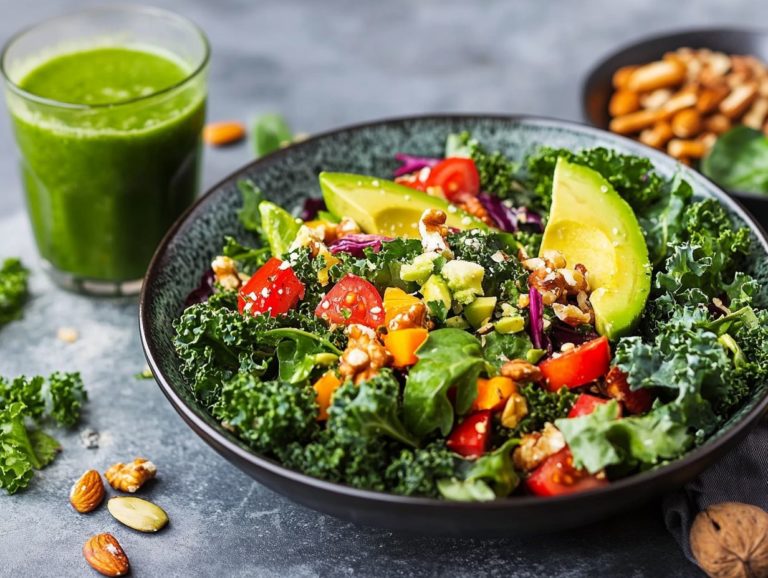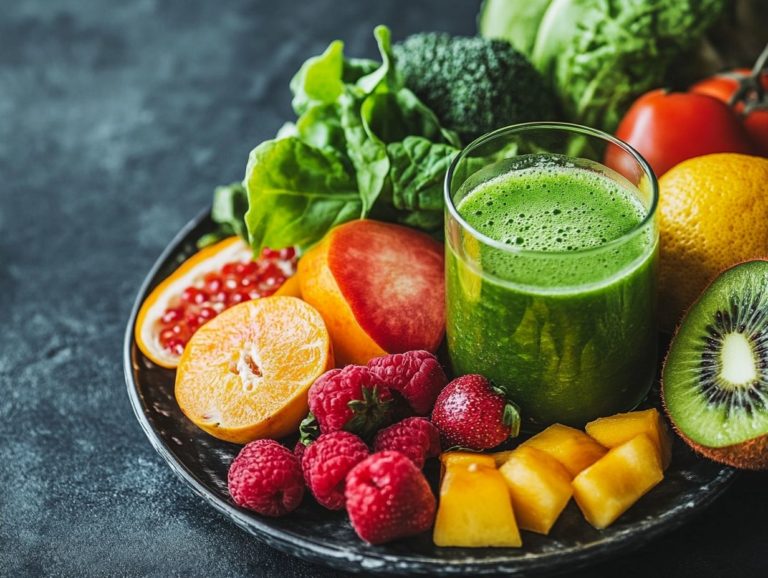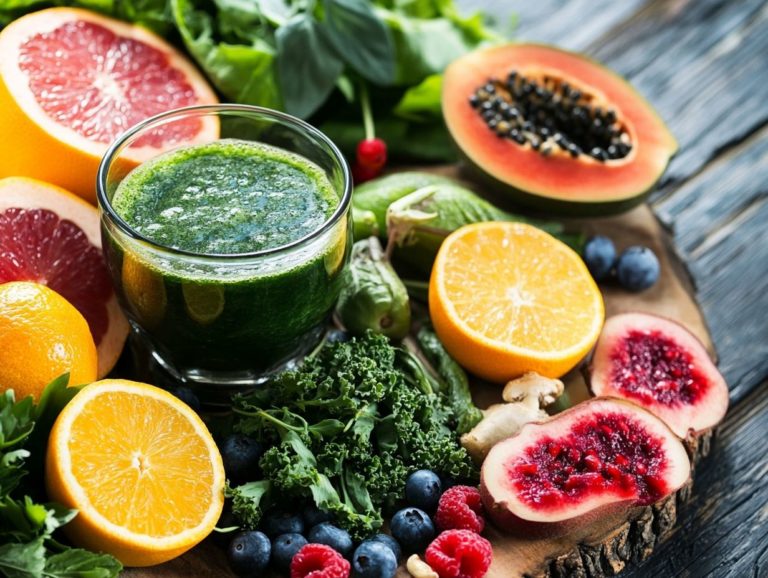5 Essential Tips for a Successful Detox
Detoxing can truly change your life. It gives you a chance to reset both your body and mind.
However, with so much conflicting information available, it’s normal to feel overwhelmed. This guide simplifies detoxing with five essential tips for success.
You will also discover the benefits and risks involved, including issues like electrolyte imbalances. Are you ready to start your detox journey?
Contents
- Key Takeaways:
- 1. Start with a Plan
- 2. Stay Hydrated
- 3. Incorporate Whole, Nutrient-Dense Foods
- 4. Avoid Processed and Sugary Foods
- 5. Get Enough Rest and Exercise
- How Long Should a Detox Last?
- What Are the Benefits of Detoxing?
- What Are the Potential Risks of Detoxing?
- How Can One Prepare for a Detox?
- What Are Some Common Misconceptions About Detoxing?
- Frequently Asked Questions
Key Takeaways:
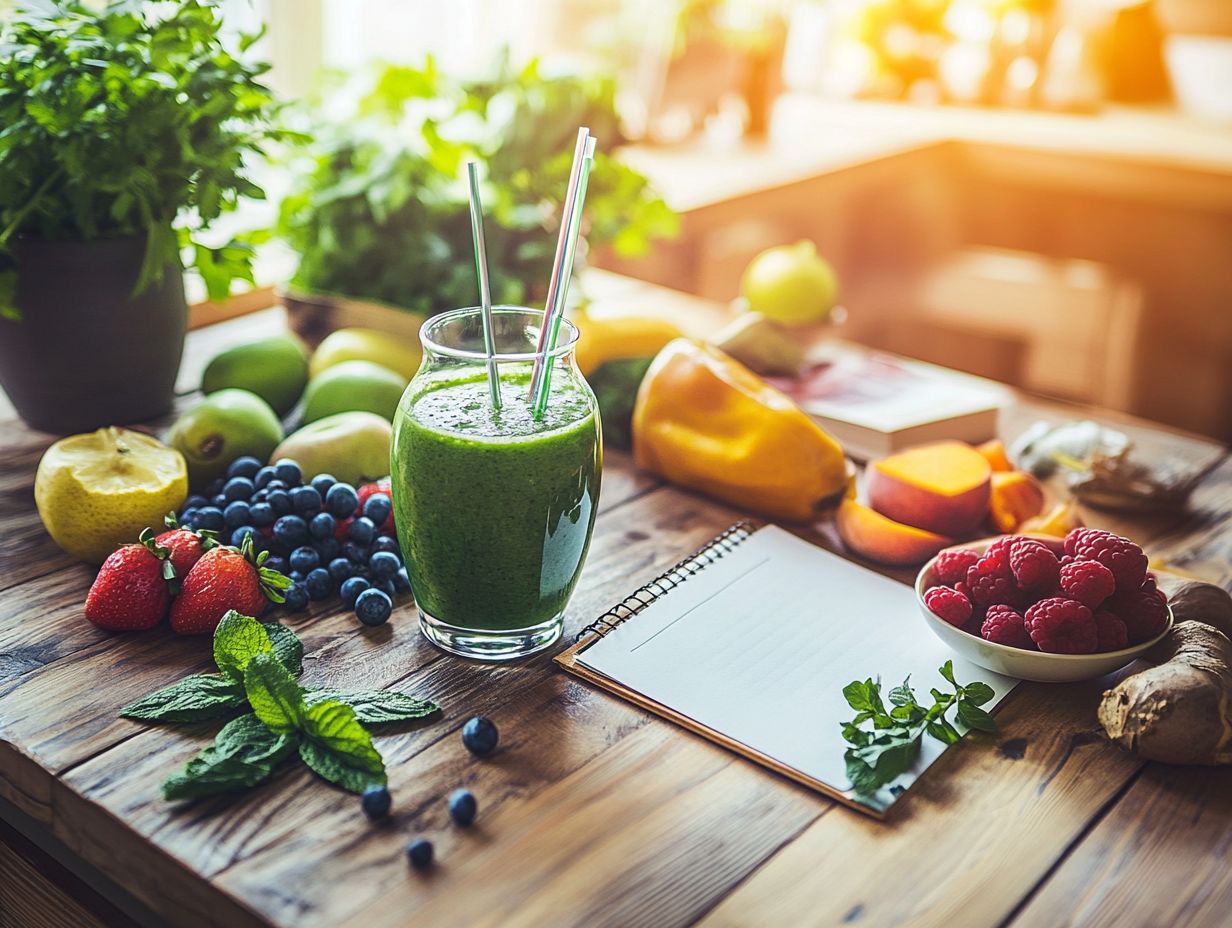
- Have a clear plan before starting your detox to stay on track.
- Hydration is key for your body s detox process and overall wellness.
- Include whole, nutrient-rich foods for essential vitamins and minerals.
1. Start with a Plan
Starting your detox requires a solid plan that fits your health goals. Think about the toxins that may affect your body.
Set clear objectives like weight loss or stress relief. Tailor your plan to your unique needs, considering any health conditions.
2. Stay Hydrated
Hydration is key. Water helps remove toxins and supports your kidneys and liver.
When you drink enough, you improve your body’s natural detox processes. Herbal teas can enhance hydration and gut health.
3. Incorporate Whole, Nutrient-Dense Foods
Eating whole, nutrient-rich foods is vital for detoxing. These foods give your body the nutrients it needs.
Choose a variety of fruits and veggies, like berries and leafy greens. Whole grains and lean proteins support digestion and cellular repair.
4. Avoid Processed and Sugary Foods
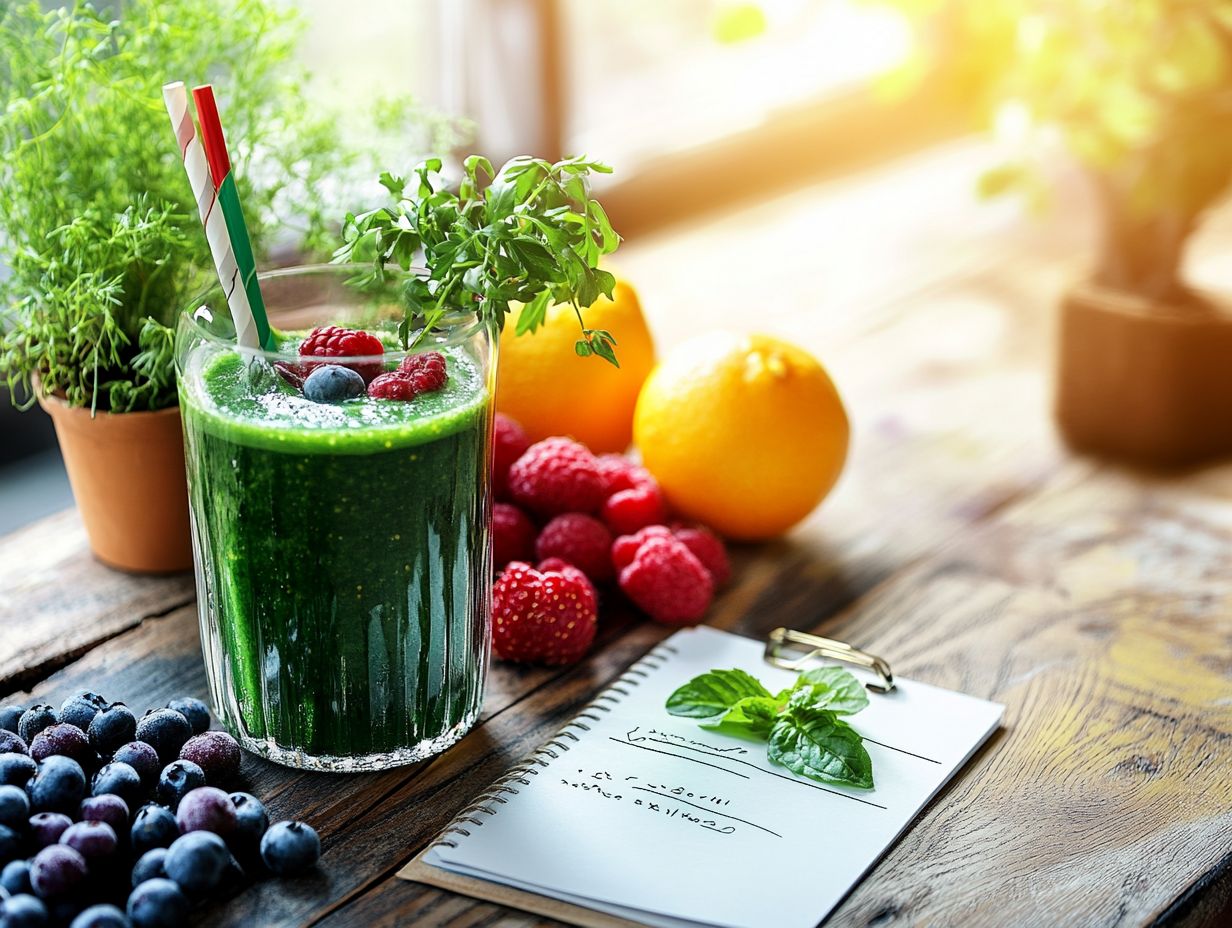
Avoiding processed and sugary foods is essential for your detox success. These foods can introduce harmful toxins and disrupt your body’s natural detox processes.
They are often packed with artificial ingredients, preservatives, and excessive refined sugars. This can lead to inflammation, weight gain, and chronic health issues.
Instead, focus on whole foods like fresh fruits, vegetables, lean proteins, and healthy fats. These choices provide the nutrients needed for metabolism and weight loss.
Incorporating fiber-rich foods promotes digestion and helps regulate blood sugar levels, which keeps cravings at bay. Try meal prepping and reading labels to make mindful choices aligned with your detox goals.
5. Get Enough Rest and Exercise
Getting enough rest and staying active are vital for a successful detox program. They help reduce stress and enhance your body’s natural detox processes.
When you create a balanced routine with restorative practices and physical activity, you boost your overall wellness. Gentle exercises like yoga and walking can enhance circulation and help your body flush out toxins.
Restorative practices such as meditation and deep breathing relax the mind and reduce anxiety. Try these simple tips to add movement into your daily life:
- Opt for the stairs instead of the elevator.
- Set aside a few minutes each day for a brisk walk.
These small changes can create a big difference in your healing and relaxation, supporting both detoxification and emotional well-being.
How Long Should a Detox Last?
The length of your detox depends on your individual goals and health needs. It’s best to choose a safe program that allows your body to eliminate toxins without excessive strain.
Factors like the type of program (a juice cleanse, whole food detox, or dietary reset) can influence how long you should detox. Also, existing health conditions may require adjusting your detox duration.
Medical professionals generally recommend a detox lasting from a few days to a few weeks. Always listen to your body and prioritize hydration and nutritional balance throughout the process.
What Are the Benefits of Detoxing?
Detoxing offers a wealth of benefits for your health. It can enhance weight loss and provide a refreshing reset by removing built-up toxins from your body.
Participating in a detox program supports your liver and kidneys. These vital organs filter out harmful substances, allowing for more effective toxin elimination.
It also promotes gut health. Detoxing can help grow beneficial gut bacteria, which are key for digestion and nutrient absorption.
Many people report a surge in energy levels after detoxing. This increase is often due to the removal of fatigue-causing toxins.
You’ll also likely notice improvements in your skin. Detox regimens can reduce inflammation, leading to clearer skin by flushing out impurities. Studies link a healthy diet and detox practices to better skin conditions, making this an appealing aspect of detoxing.
What Are the Potential Risks of Detoxing?
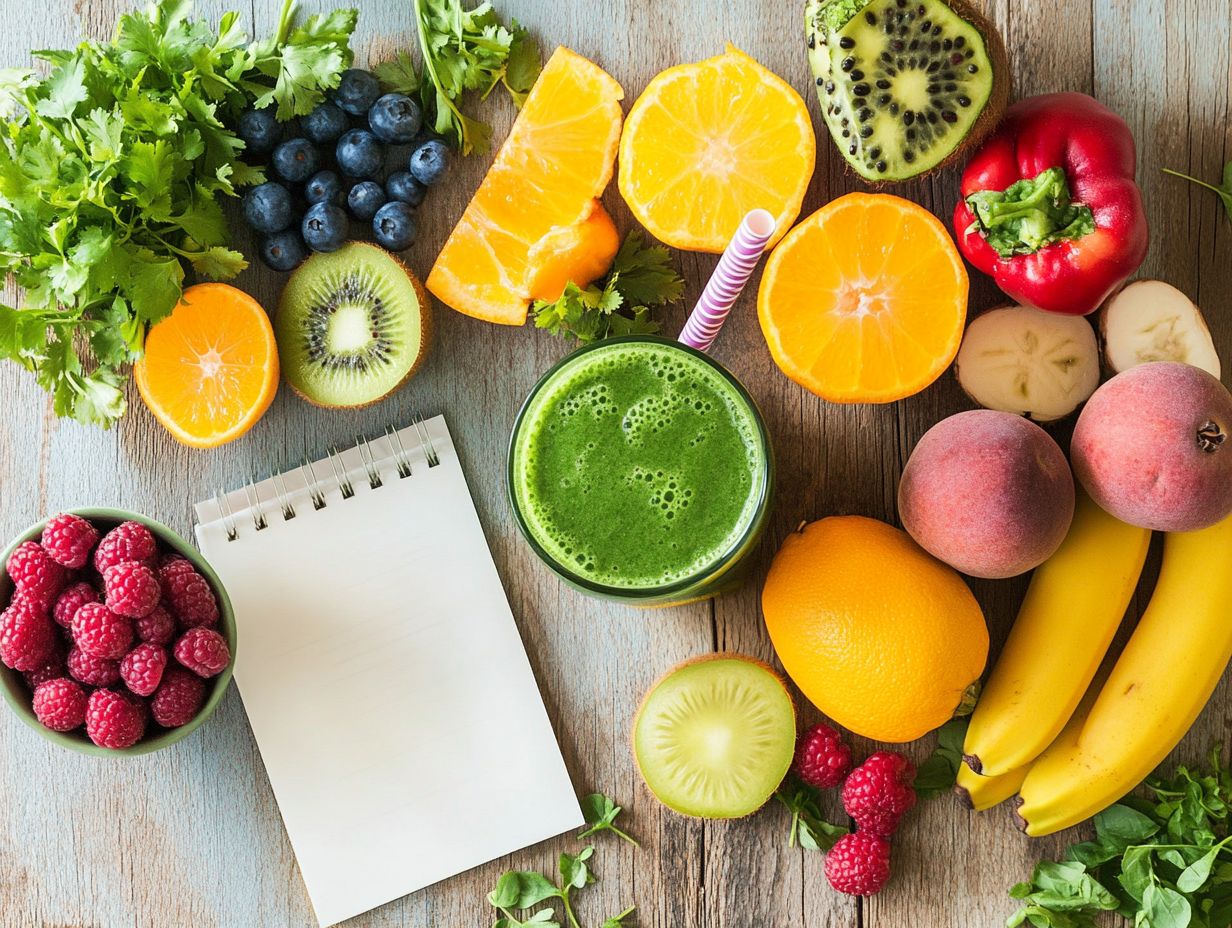
While detoxing can offer health benefits, it’s important to know the potential risks involved. These include electrolyte imbalances and strain on your body’s natural detox processes.
These dangers often arise from extreme detox methods, such as prolonged fasting or unregulated herbal supplements. Many people mistakenly believe that drastic measures are essential for cleansing.
A balanced approach tends to be far more effective. Consulting a healthcare provider helps ensure that any detox method you choose is safe and tailored to your unique health needs.
Safe detoxification should be a gradual journey. Focus on nourishing your body with wholesome foods and staying hydrated while promoting a gentle and effective cleanse.
How Can One Prepare for a Detox?
Preparing for a detox means making informed lifestyle changes and setting clear goals to enhance the detoxification process.
This journey starts with consulting a medical professional. Their expertise can guide you on safe practices tailored to your unique health needs.
Assess your current dietary habits and identify areas for improvement to boost your body s natural detox mechanisms. Gradually eliminating harmful substances, like alcohol and processed foods, is vital.
Don t overlook mental and emotional readiness. Cultivating a positive mindset can significantly influence your outcomes, making the transition smoother and more effective.
What Are Some Common Misconceptions About Detoxing?
You may encounter several common misconceptions about detoxing that can lead you astray. For instance, many believe that extreme fasting is essential or that detoxing will magically deliver immediate weight loss.
Others think achieving beneficial results requires investing in pricey supplements or the latest detox teas. This overshadows an important truth: your body s own systems are remarkably capable of detoxification without extravagant products.
The timeline for reaping the rewards of detoxing is often distorted. While many expect results overnight, sustainable changes require time and a balanced approach to both diet and lifestyle.
By understanding these realities, you can enable yourself to make more informed choices about your health.
How Can One Maintain the Benefits of a Detox After It Is Over?
Maintaining the benefits of a detox once it s over requires you to commit to ongoing lifestyle changes, including a healthy diet.
Regular physical activity and effective stress management practices are essential. Focus on sustaining these benefits to thrive post-detox through intentional choices each day.
Prioritizing hydration is key. Drinking plenty of water helps flush out toxins and keeps your energy levels stable.
Embrace a balanced diet rich in whole, nutrient-dense foods think fruits, vegetables, lean proteins, and healthy fats. These provide the essential vitamins and minerals necessary to support your ongoing health journey.
Incorporating mindfulness practices such as yoga or meditation can enhance your mental clarity and emotional resilience, both crucial for maintaining overall wellness.
As you gradually reintroduce foods, opt for less processed foods to allow your body to adapt smoothly without feeling overwhelmed.
Frequently Asked Questions
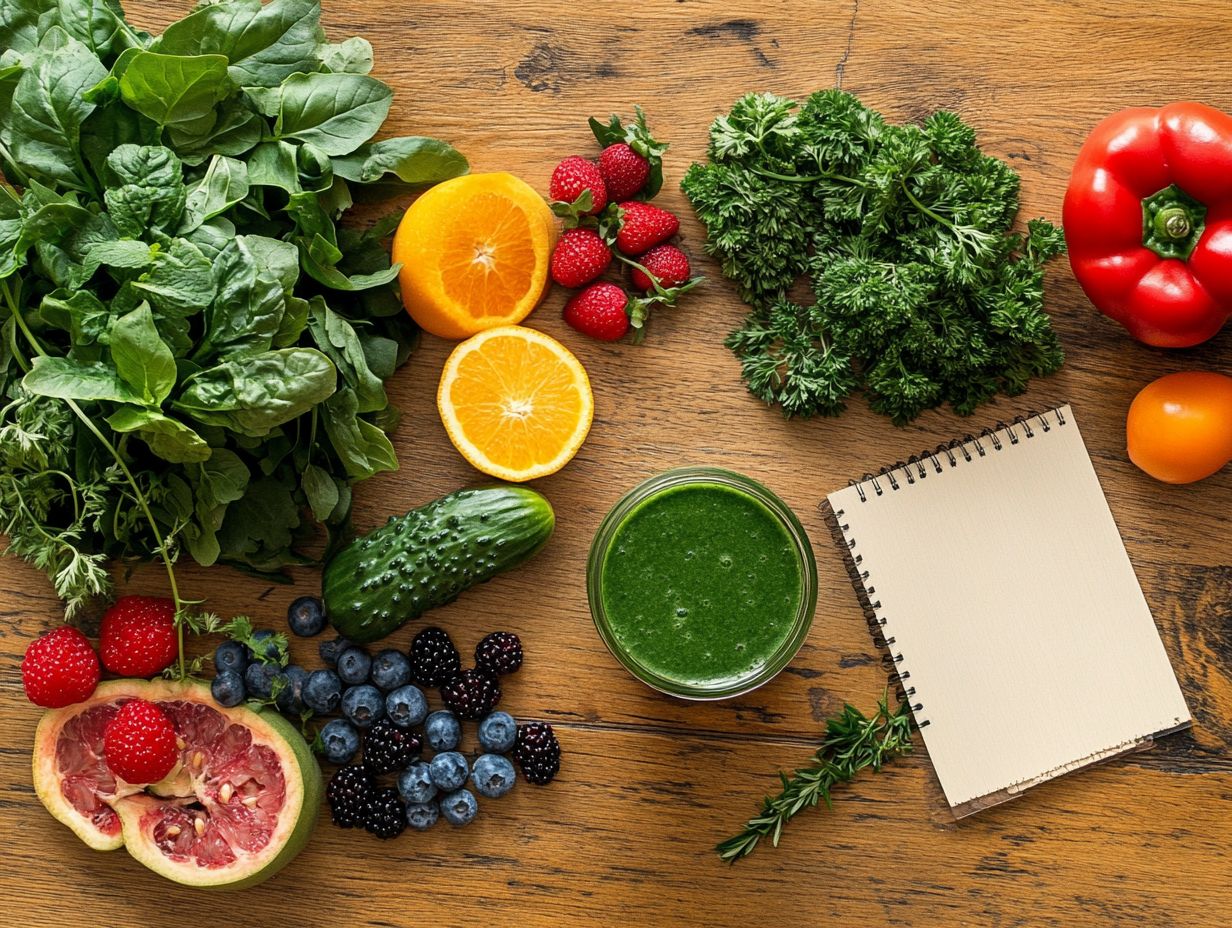
What are the 5 essential tips for a successful detox?
- You must hydrate!
- Eliminate processed foods and sugar from your diet.
- Increase your intake of fruits and vegetables.
- Incorporate exercise and movement into your daily routine.
- Get enough rest and sleep to allow your body to cleanse and restore.
Why is hydration important during a detox?
Staying hydrated is vital during a detox because it helps flush out toxins from your body. Water also supports your kidneys and liver, which are key organs in the detoxification process and play crucial roles in your health.
What foods should I avoid during a detox?
During a detox, you must avoid processed foods and foods high in sugar. These can add more toxins to your body and hinder the detoxification process. It is also advisable to avoid caffeine, alcohol, and dairy products during a detox.
How can I incorporate exercise into my detox?
Incorporating exercise into your detox can boost your metabolism and aid in the elimination of toxins. Activities like yoga, walking, and light cardio are beneficial during a detox and support your health.
Just be sure to listen to your body and not overexert yourself.
Can I do a detox while pregnant or breastfeeding?
It is not recommended to do a detox while pregnant or breastfeeding. Your body is already working hard to support the growth and development of your baby, and a detox may disrupt your body’s natural detox mechanisms.
How often should I do a detox?
The frequency of detoxing depends on your individual needs and health goals, considering factors like environmental exposure and personal history with functional medicine.
Some people may benefit from doing a detox once a month, while others may only need to do it a few times a year. It is important to listen to your body and consult with a healthcare professional before starting a detox.


